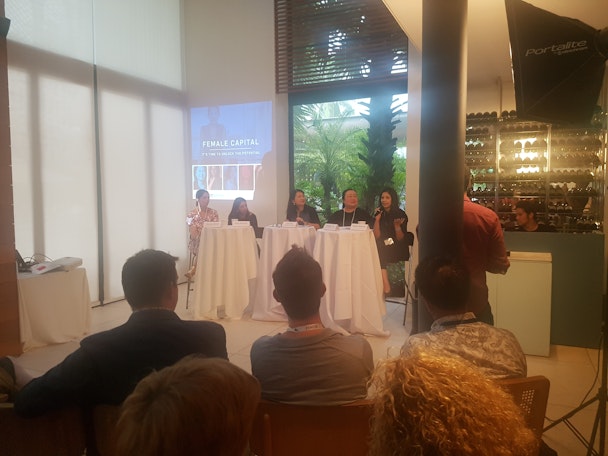Singapore businesses have just 9.7% female board member representation
Singapore businesses have a 9.7 per cent female representation as of June 2016, according to Junie Foo, chair of BoardAgender and head of corporate banking, Singapore at Bank of Tokyo-Mitsubishi.

J. Walter Thompson female capital event
The figures were revealed at a J.Walter Thompson event at Spikes Asia in Singapore this week which aimed to look at raising the profile of ‘Female Capital’, the economic impact or potential impact that women have on the world.
BoardAgender, an initiative of the Singapore Council of Women's Organisations, has been keeping track of Singapore’s credentials in terms of female representation on boards and said that while there’s been an increase from 6.4 per cent four years ago, the 9.7 per cent figure for 2016 was “embarrassing”.
Foo, said: “When BoardAgender started there was no research in Singapore on the scene. I think in Singapore we tend to also hide behind the façade of meritocracy but it’s still an old boys club. Female representation on boards was only 6.4 per cent and four years later it is 9.7 per cent, as of June 2016. We are probably ranked third from last, with only Japan and Korea worse than us. Malaysia is ahead of us. It is embarrassing if Singapore wants to be a financial centre, the gender rep is embarrassing.”
Foo was chairing a panel of female leaders from Singapore and the marketing industry. She was joined by Shereen Daver, global business lead for J. Walter Thompson’s major research project into women Female Tribes, Roshni Mahtani, co-founder of Female Founders and CEO of Tickled Media, Georgette Tan, SVP of communications APAC for Mastercard and Richa Goswami, APAC head of digital for Johnson and Johnson consumer group and advisory board member.
JWT’s Daver spoke using the context of Female Tribes, explaining that the research project was originally a passion project of one of her colleagues that the agency then decided to put investment into as a part of its business. Started by a JWT planner who was fed up of seeing the term ‘busy working mum’ in briefs, the idea behind Female Tribes was to start to be able to better inform clients on how to approach the myriad of female consumers with very different personalities.
“We need to change briefs because that then leads to changing content and then changing role models. We are all role models and we are all responsible. Men are included in this too, for jobs men tend to intro other men because they don’t know other women in the industry,” she said.
Female Founders co-founder Mahtani, said it was in the interest of businesses to think like this as having consumers inside businesses made better business sense.
“It starts from the hiring process. The majority of products are bought by women and particularly FMCG products are bought by mums. You need to recognise who your users are and we need to bring in our users into our workforce to have most amount of innovation. Women are perceived as a setback due to maternity and childcare as they can’t work as long hours. Instead of trying to convince the HR team to change their mindset, they need to understand that we are profit driven and the best business bring top consumers into their organisation. Once HR realises that more businesses will be welcoming to hiring women,” she said.
Both Tan from Mastercard and Goswami from Johnson and Johnson gave examples about how their brands had taken on this attitude.
Tan said Mastercard had started an index into female consumers in 2005, earning how females make decisions. She said, “women aren’t a segment, they are a market.”
At Johnson and Johnson, Goswami said the Clean and Clear brand, which is aimed at teenagers was still skewing marketing budget towards TV. She said having a mother’s viewpoint allowed her to change this, pushing the marketing budget in India for the brand towards emerging platforms such as Snapchat where she knew the audience was spending time based off her own children’s habits.

